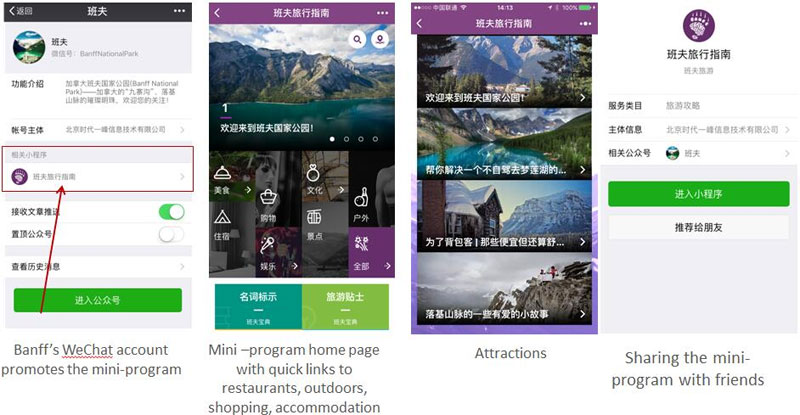Mini-programs, also known as Xiaochengxu in Chinese, are a new function of China’s most popular social media platform, WeChat. Launched in January 2017, mini-programs have similar functions as native apps, but they are hosted on and accessed through WeChat. So far, they’ve been slow to catch on among WeChat’s 938 million monthly active users, but WeChat’s parent company Tencent is committed to the mini-programs and has been working to make them better and better. Plus, mini-programs do have a number of significant advantages over native apps, as well as complementary features to WeChat service and subscription accounts. Travel is one industry where there is a lot of potential for WeChat mini-programs, and some companies and destinations are starting to catch on.
Features and advantages
Users can access mini-programs by scanning a QR code, by searching for their service name on WeChat, or by clicking on a link shared by friends. Once opened, mini-programs will are automatically saved under the mini-program folder.
In terms of advantages for users, mini-programs run faster than apps, and because they are cloud-based, they do not require phone installation, so they take up much less room on a user’s phone. For example, Ctrip’s streamlined mini-program is just 1MB, compared to 114.6MB for the full-function app. They’re also easy to find directly through WeChat and do not need to be downloaded through an app store, and they work on any kind of smart phone.
Mini-programs also have advantages for developers. Native apps require both iOS and Android versions, as well as testing, but mini programs do not. As a rule of thumb, a mini-program only takes half the time needed to develop an app, saving both time and money.
The user experience with mini programs is good – they load much faster than HTML5 pages, so they run more smoothly and are easier to navigate than a WeChat service account. On Android phones, a mini-program can work concurrently with other WeChat functions, as it becomes a standalone page that can be pinned to the home screen, acting in effect as a native app. The advantage here is that users can check their WeChat messages without having to retrieve the mini-program page afterwards.
Mini programs are very strong when it comes to promoting online to offline activities. For example, a retail company can create a mini-program for each individual shop, with the address, contact information, coupons and membership cards. Users can then search these mini-programs through the ‘mini-programs nearby’ LBS function, allowing them to find nearby shops and look at what kind of promotions and products they have there. Mini programs can be used to sell directly as an e-commerce program.
On the other hand, businesses can also encourage offline to online use by providing WeChat users at an event or shop with QR codes that will then open the mini-program on the users’ phones.
Mini programs can be used as an ecommerce platform, as they already are by luxury brands like Lane Crawford. This can complement companies with content-driven subscription accounts by giving them a good monetization opportunity. In terms of travel, review sites like Qyer or Mafengwo can now use mini-programs to sell travel products, while keeping their subscription accounts content-focused. At the same time, mini-programs can drive sales campaigns with promotion and coupons.
Other promising WeChat mini-program functions include a good search function for users, as well as the ability for brands to see how many times a key word is searched daily, and live streaming capabilities, which are particularly important given the rapid rise of video content in China.
Mini programs for the travel industry
As previously mentioned, WeChat mini programs can provide a good complement to subscription accounts, as they can be used to sell products directly. Like mobile apps, mini-programs can also support bookings, check in and other travel services, and they are already being used by travel brands like Booking.com, Huazhu Hotels and Spring Airlines.
Canadian national park, Banff & Lake Louise Tourism has been one of the first overseas travel destinations to launch a WeChat mini-program. This mini-program serves as an interactive, digital brochure to help visitors keep up to date with the park’s activities, and it is promoted on Banff’s WeChat account. Users have access to a directory with quick links to activities, restaurants, accommodation, shopping, attractions and more useful information, and they can also create and save itineraries. An LBS function provides location-based recommendations for visitors at the destination, which helps local providers to reach a Chinese audience. A map function and photos of attractions, restaurants and other destinations allows visitors to visualize and plan their time at Banff and Lake Louise most effectively.

Future potential
Although WeChat users have been reluctant to embrace the new mini-programs, Tencent is very focused on making them a success, and their popularity is sure to grow. There are many potential applications of these programs for tourism, from bookings and concierge services to location-based directories and recommendations. With so much potential, as well as relatively quick and easy development compared to native apps, WeChat mini apps are a promising new area for digital marketing in China.
Suscríbase a nuestro boletín gratuito para mantenerse al tanto de las últimas noticias
NO COMPARTIMOS SU INFORMACIÓN CON TERCEROS. CONSULTE NUESTRA POLÍTICA DE PRIVACIDAD.
This website or its third party tools use cookies, which are necessary to its functioning and required to achieve the purposes illustrated in the cookie policy. If you want to know more or withdraw your consent to all or some of the cookies, please refer to the cookie policy. By closing this banner, scrolling this page, clicking a link or continuing to browse otherwise, you agree to the use of cookies.